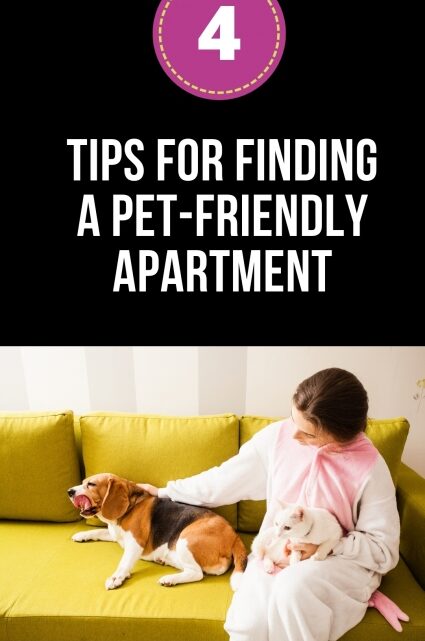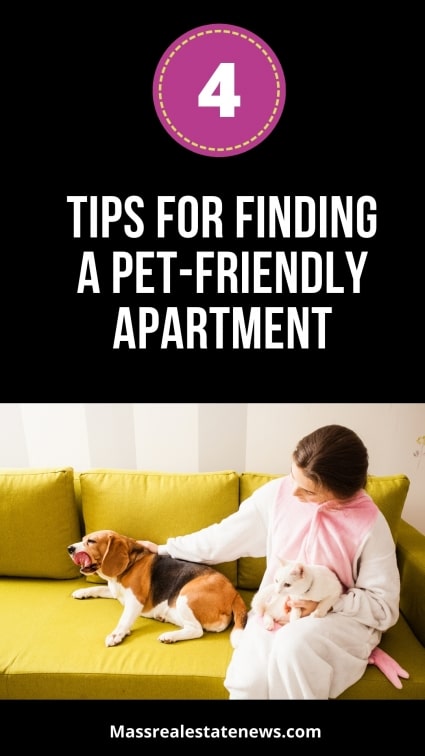How to Find Pet-Friendly Apartments
Are you looking to find a pet-friendly apartment? Some people regard them as animals, but for many of us, they’re family. You probably know someone who prefers the companionship of dogs or cats to humans.
Of course, we’re generalizing. You might have an exotic creature instead of a canine or feline as a pet, but we digress.
Unfortunately, some landlords don’t feel the same way as we do and don’t allow four-legged tenants in their buildings. Those building owners who do love animals may prohibit them on their premises to comply with legislation or insurance policies.
If you’re one of an estimated 72% of renters who have pets, it can be tough to find pet-friendly apartments when you’re looking for a place to live.
So what should you do in that situation?
Be aware that finding a rental can be more challenging if you have a large dog or a restricted breed, such as:
- German Shepherds
- Mastiffs
- Rottweilers
- Akitas
- Doberman Pinschers
- Staffordshire Terriers
- American Pit Bulls
- Huskies
- Dalmatians
- Chow Chows
- Boxers
Here are four tips that’ll make your home search more manageable because you’ll find many residences that’ll accept you and your animal companion.
Check With the Local Community
As Usaj Realty suggests on its website, you should consult local experts if you’re looking to rent a property. People who live in the community know the area better, and you’re likely to get more leads than if you checked online.
Besides real estate agents, you can also get in touch with the humane society or shelter. It would help if you asked vets, too, as they come into contact with residents. Word-of-mouth is an excellent way to get information based on experience and not part of advertising.
Ask everyone who loves animals for help. They’ll gladly assist a fellow pet lover because they understand how valuable your companion is to you.
If you own a canine, it’s advisable to identify locations where there are parks that allow dogs. Then, find apartments within that vicinity. You don’t want to have to drive miles away to be able to give your furry friend much-needed exercise.
Also, check for pet services such as boarding, groomers, veterinarians, and doggie daycare. Again, you would want to live where it’s convenient to get medical care and other necessities for your pup.
You will probably have to make some sacrifices. Don’t expect to land your dream apartment when you have pets in tow.
Provide Proof That You’re a Responsible Pet Owner
Many owners are concerned with having animals in their buildings because they worry that other tenants will complain about property damage and noise.
However, if you can prove that you care for your pet responsibly, you stand an excellent chance of being accepted as a tenant.
Compile documented evidence, such as a reference letter from your current and previous landlords, to support your claim. These recommendations are invaluable as homeowners are more likely to trust a fellow owner than take your word for it.
Another source of validation is a statement from your vet, confirming that you’ve been taking proper care of the animal’s medical needs. A sterilization and vaccination report will convince future lessors that your pet is less likely to be a nuisance or risk to neighbors.
If your dog has completed behavioral training school, provide written proof of its evaluation. Having professionals vouch for your doggie’s good behavior will strongly support your case.
In short, always keep a resume of yourself and your pup. You should maintain a complete dossier that you can use whenever needed rather than present a disorganized collection of documents.
Be Prepared to Pay More
Landlords don’t prohibit animals in their buildings because they dislike them. However, they have to consider the possibility of financial loss in the event of property damage or tenants’ complaints.
Besides the assurance that your pet’s well-behaved, if you offer to minimize the property owner’s monetary risks, you’ll likely get the lease.
These are a few ways you can use your money to gain an advantage.
- Purchase your own renter’s insurance that covers your animal friends. Lessors will feel at ease knowing that they won’t be liable for any problems your doggie causes.
- Offer a higher security deposit to pay for any damage your furry baby may cause to the property. It’s standard practice to fork out at least 40% of the monthly rent. This sum is refundable minus any deductions for repairs or repainting costs.
- Expect to incur a one-time pet fee upon signing of your lease. It’ll cost between $200 and $500 depending on size and breed.
- Be also prepared for a recurring monthly cleaning charge of $50 to $100.
However, before you commit, do your math and make sure the additional recurring expenditure is within your budget.
Look for Private Landlords
Independent landlords are easier to negotiate with than property management companies. They’re also often more flexible and willing to work out some arrangement. Strict rules usually bind professional managers, and most of them rarely budge from their no-pets regulation.
If you find a private owner who loves animals, it’s almost surely a done deal. Finding a home when you have pets will be easier when choosing this avenue.
It’s a Worthwhile Challenge
Finding affordable rental housing is difficult for many people, and it’s more challenging for pet owners. However, if you follow the above suggestions, the process can be smoother and less stressful.
To avoid any possible future disputes, read the fine print of the agreement to ensure that everything discussed is stipulated. Always exercise due diligence when dealing with legal matters. It’ll save you lots of headaches later on.
Also, know your renter’s rights when you move from one state to another, as the laws will vary in each location.
Most importantly, you should never sign a lease that states that no pets are allowed. It doesn’t matter if the landlord and other residents assure you that it’s only a formality. You’ll be setting yourself up for potential problems in the long run.
There are many issues to consider and costs involved, but it’ll be worth it in the end. After all, our pets are family, and they deserve a home.
 About the author: The above article on finding pet-friendly apartments was written by Wendy Dessler. Wendy is a super-connector who helps businesses find their audience online through outreach, partnerships, and networking. She frequently writes about the latest advancements in digital marketing and focuses her efforts on developing customized blogger outreach plans depending on the industry and competition.
About the author: The above article on finding pet-friendly apartments was written by Wendy Dessler. Wendy is a super-connector who helps businesses find their audience online through outreach, partnerships, and networking. She frequently writes about the latest advancements in digital marketing and focuses her efforts on developing customized blogger outreach plans depending on the industry and competition.










No Comment